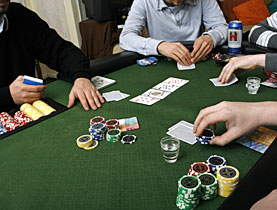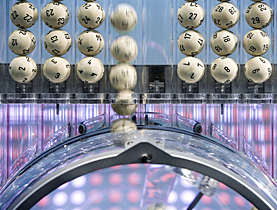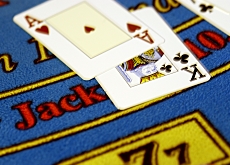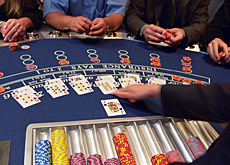Poker boom forces cantons’ hand

Switzerland's cantons are drawing up legislation for poker tournaments following a government decision to end casinos' monopoly on the increasingly popular pastime.
While the country’s poker players and tournament organisers are flushed, casinos are not so happy and others are warning of “negative effects on society” unless new laws are introduced.
In December 2007 the federal gaming board ruled that certain poker tournaments counted as skill and as such could be held outside casinos – with the canton’s approval. Games of luck remain illegal outside casinos.
Casinos, concerned about losing business, challenged this decision but were trumped on June 30 by the federal administrative court, which backed the gaming board.
Manuel Richard from the intercantonal Swiss lottery and betting board (Comlot) told swissinfo.ch there was an urgent need for action, describing the current situation as “untenable”.
“It’s problematic insofar as these games contain elements of luck, and when money is added there can be socially harmful consequences – gambling addiction, the risk of cheating and fraud, also money laundering,” he said.
“As a result of the [2007] decision, these games are now being played in places without any regulations.”
For that reason Richard said a cantonal working group had been set up to draft legislation by the autumn to limit the “negative effects on society”, for example by making tournament organisers apply for a licence.
Currently Basel Country is the only canton that could ban poker tournaments as it has a ban on gambling, which would include games of skill if money is involved.
Feeling lucky?
Ultimately it all comes down to whether games are predominantly based on skill or luck: the government rules on the former, cantons the latter.
In the government’s eyes, certain types of tournament poker are predominantly skill-based – depending on various conditions such as the number of participants and the size of the stakes.
Cash games on the other hand, in which players can “chip up” and leave whenever they want, are considered predominantly luck-based and are therefore illegal outside casinos.
“For us every form of poker, every tournament format, is luck,” said Marc Friedrich, head of the Swiss Casino Federation.
Friedrich added that addicted gamblers, barred from casinos, played in such tournaments.
He admits however that business has been hit by the government’s decision, with players crossing their fingers elsewhere. “The decrease since 2007 is clear.”
But tournament organiser and poker professional Rino Mathis says the opposite is true, “knowing for sure” that casinos in Montreux and Baden have seen more punters hoping to win big in cash games, legal only in casinos.
Private games among friends are legal as long as no commission is paid to the homeowner, although the authorities would probably turn a blind eye to the odd beer exchanging hands.
“Liberal Switzerland”
The news comes just ahead of Switzerland’s biggest poker tournament ever held outside a casino, taking place in Zurich from August 9-16.
Mathis, who is organising the SwissPokerMasters 2009, expects around 6,000 entrants, ten times as many as last year in Bern.
Each will be hoping to win not only the title of “Swiss champion” but also SFr25,000 ($23,300) in cash and an all-inclusive package worth SFr15,000 for the European Poker Tour in the Bahamas.
This is small change compared with the World Championships in Las Vegas. Earlier in July just under 6,500 people each paid $10,000 (SFr10,700) to enter the main event. The final nine will have to wait until November 7-11 to play for their share of $27 million, with the winner getting a cool $8.5 million.
When it comes to tournament density however Switzerland is beaten only by the US. Websites such as Buy-in.ch advertise around 50 tournaments a night, featuring 20-100 players.
“From an international point of view, Switzerland now belongs to one of the most liberal countries regarding poker,” Mathis said.
He adds that around 50 Swiss earn their living from poker. Most however keep this quiet – not out of shame but because of the tax man…
Thomas Stephens, swissinfo.ch
Earlier this month the Federal Justice Office revealed that the Swiss spent a record SFr2.85 billion ($2.65 billion) on lotteries and gambling in 2008.
After a slight decline in 2007, last year’s figure showed an increase of SFr50 million compared with 2006.
In 2008 an average of SFr370 per capita was spent on lotteries and bets, an increase of SFr10 compared with the previous year.
The turnover of Euro Millions increased by about ten per cent to reach SFr454 million. Turnover at Swiss Lotto fell by SFr24 million but it still ranks first with total sales of SFr545 million.
The record figures at Swiss lotteries also help the cantons, with SFr535 million flowing into the coffers of various organisations, including those connected with sport.
In Switzerland around 126,000 people gamble “excessively”, according to a study presented by the federal commission on casinos published last month.
Swiss voters agreed to lift a ban on gambling in a referendum in 1993.
The Swiss government granted the first round of concessions allowing casinos to be set up in 2001. The government awarded so-called Class A licences to seven casinos, all of which are allowed to operate with no upper limit imposed on bets.
The 18 members of the Swiss Casino Federation possess 3,223 slot machines and 233 gambling tables.
The government recently proposed to modify the law on slot machines, allowing them to be reintroduced in restaurants. However it was badly received by almost all sectors of the industry.
Swiss casino operators can be fined up to SFr500,000 for letting gamblers who have been barred from playing return to the tables.

In compliance with the JTI standards
More: SWI swissinfo.ch certified by the Journalism Trust Initiative




You can find an overview of ongoing debates with our journalists here. Please join us!
If you want to start a conversation about a topic raised in this article or want to report factual errors, email us at english@swissinfo.ch.